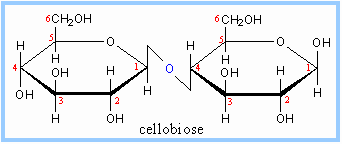What is the difference between a reducing disaccharide and a nonreducing disaccharide?
1 Answer
Dec 21, 2015
A reducing disaccharide contains a free hemiacetal unit.
Explanation:
A nonreducing disaccharide has no free hemiacetal units.
For example, maltose (4-O-α-D-glucopyranosyl-D-glucopyranose), is a reducing sugar, because it has a hemiacetal group.

Cellobiose (4-O-β-D-glucopyranosyl-D-glucopyranose) is also a reducing sugar, because it has a free hemiacetal unit.

On the other hand, sucrose (α-D-glucopyranosyl-(1→2)-β-D-fructofuranoside) is a nonreducing sugar, because it has no free hemiacetal unit.

Trehalose (α-D-glucopyranosyl-(1→1)-α-D-glucopyranoside) is a common sugar found in the blood of insects. It is a nonreducing sugar, because it has no free hemiacetal unit


